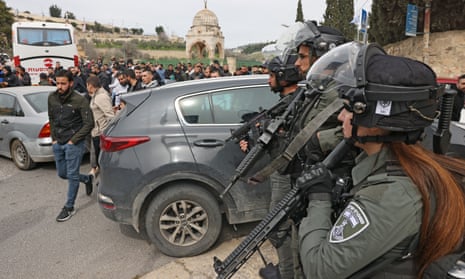A Palestinian boy has died after being shot by Israeli border police at a refugee camp in East Jerusalem in the first such fatality in the Israeli-annexed territory during Ramadan.
The child – who was reported as being 12 or 13 years old and named as Rami Hamdan al-Halhouli by local media – suffered a fatal gunshot wound during clashes between residents of the Shuafat refugee camp and police.
In a statement, Israeli border police said violent riots broke out in the camp for the second consecutive night, and that during the unrest a single shot was fired by an officer towards a suspect “who endangered the forces while firing aerial fireworks in their direction”.
“The suspect was apprehended, arrested, and transferred for medical treatment,” the statement said. Police later told the AFP news agency that the boy had died from his wounds.
Images on social media showed teenagers launching fireworks in narrow streets in Shuafat amid clouds of teargas. The Palestinian Red Crescent said it had treated five people wounded by Israeli fire.
Israel’s border police units were already deployed in the camp, on the outskirts of East Jerusalem, which is the only major Palestinian refugee camp on the Israeli side of the West Bank wall.
Ben Gvir, Israel’s far-right minister of national security, said he backed the police and saluted the officer who fired the fatal shot. “This is exactly how you should act against terrorists – with determination and precision,” he said.
Benjamin Netanyahu, Israel’s prime minister, stripped Ben Gvir of responsibility for policing Ramadan earlier this month, after the minister proposed banning even Israel’s Muslim minority, who make up about 18% of the population, from visiting the raised compound in Jerusalem’s Old City known as al-Haram al-Sharif, to Muslims, and the Temple Mount to Jews, to pray during Ramadan.
Instead, Israeli police have been told to limit numbers according to immediate security and crowd control criteria, with a review after a week.
Residents of the occupied West Bank have been told that women, children and men under the age of 60 can travel to Jerusalem to pray, but may encounter long delays at checkpoints and may still be turned away.
“We are prepared for Friday prayers … Thousands [of police officers] will be in the area of the Temple Mount,” said Ch Supt Mirit Ben Mayor, a police spokesperson.
In a separate incident west of Jerusalem, in the town of Al-Jib, at least two other Palestinians were killed and three others injured after being shot by Israeli forces at a checkpoint late on Tuesday, the Palestinian Red Crescent said.
Two Israeli security personnel were reported to have been wounded in a stabbing attack by a 15-year-old Palestinian boy near a checkpoint between Jerusalem and the West Bank city of Bethlehem early on Wednesday morning. Police said Israeli security forces shot and killed the attacker.
The Palestinian official news agency Wafa reported that the boy was left by security forces at the checkpoint “to bleed until he died”.
Israeli forces also shot dead another Palestinian in the restive West Bank city of Jenin in a dawn raid on Wednesday, bringing to six the number of people killed in the Palestinian territory within hours.
Israelis and Palestinians have been bracing for a tense and potentially violent month, with no sign of a ceasefire likely in Gaza and calls from Hamas for protest marches around the Islamic world.
Hopes for a halt to hostilities before the Muslim holy month rose last week, but have dimmed since indirect talks in Cairo ended without progress.
The war in Gaza was triggered by Hamas’s attack on southern Israel in October, in which about 1,200 people, mostly civilians, were killed. Israel then launched an offensive into Gaza that the health ministry in the Hamas-run territory says has killed more than 31,000 people, mostly women and children, reduced much of the territory to ruins, and left a quarter of the population on the brink of famine.
Violence in the West Bank, which had been on the rise for more than a year, has worsened since the start of the war in Gaza, where health authorities said on Wednesday 88 people had been killed and 135 injured in the past 24 hours of Israeli airstrikes.
Residents and health officials said an Israeli strike had killed five people at a facility being used as an aid distribution centre by the main UN agency for Palestinians in Rafah, on Gaza’s southern border with Egypt. Israel’s military did not immediately comment.
Reuters and Agence France-Presse contributed to this report
